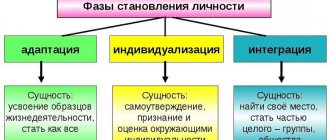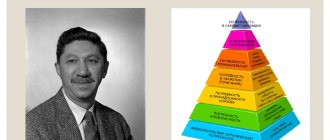The article explains:
- What is self-knowledge
- Types of self-knowledge
- Where to start self-knowledge
- The most effective means of self-knowledge
A person develops throughout his life. This is a completely natural and natural process, which indicates that the individual is turning into a personality. On this long journey, everyone is trying to get to know themselves, their abilities and capabilities better. As a result, a person improves, achieves success, and is fully realized in life.
A person’s self-knowledge plays an important role in understanding one’s own “I”. This is a mental process associated with understanding one’s place in this world. It involves very serious work on oneself, including analysis of actions and reflection on activities. Therefore, not everyone can and is able to cope with this. But this work is rewarding, because it helps you get to know yourself and become better. Read on about the features and methods of self-knowledge.
Meaning and general characteristics
The definition of “self-awareness” includes the study of personal characteristics, awareness of one’s deeper essence, as well as mental and physical abilities.
Self-knowledge is a serious need that only humans experience. This is the process of learning one’s potential and actual capabilities, personal, intellectual qualities, character traits, and one’s relationships with other people.
For some, self-awareness does not take much time: it happens in one moment. And for others, it takes years, decades, and sometimes their entire lives to define themselves in this world.
In science, this definition is best explained in psychology. It helps to identify the semantic functions of self-knowledge. For example, in psychology the following facets of self-awareness are distinguished:
- criterion of a psychologically healthy personality;
- a way to achieve inner harmony and psychological maturity;
- the path of self-development and self-realization of the individual.
All these functions are interconnected and help to create a holistic portrait of a mature and healthy person.
Self-knowledge helps resolve conflicts and understand the motives of one’s own actions. Through self-knowledge, a person learns to manage his life.
Only through knowledge does a person become an individual, find happiness and share it with the people around him.
In the process of self-awareness, creative abilities develop, the individual finds new ways to solve problems that are based on mutual understanding, empathy and mutual assistance.
The definition of “self-awareness” has several meanings:
- Religious. Here this is a means that helps to achieve unity with God, to realize the Divine principle in oneself.
- Everyday. Here this is a way to make the most extensive use of your abilities, this is a method with which you can control other people.
- Psychological. Here it is a means that helps to gain psychological health, inner harmony and maturity.
Psychologists and philosophers agree that self-awareness is initially an instinctive process, while conscious perception is a product of life experience.
Self-image
“I-image” (“I-concept”) is an individual attitude, a system of a person’s concepts about himself. It consists of the results of knowing oneself in different situations, correlating oneself with other people, and the opinions of people significant to the individual.
There are many classifications of self-concept in science. For example:
- I am open (I know about myself, everyone knows about me)
- I am private (I know others don’t know this about me)
- I am blind (others know, I don’t know)
- I am the unknown (no one, not even me, knows this about me)
Types of self-awareness
In psychology, the following types of self-knowledge are designated:
- indirect;
- natural;
- self-confession;
- reflection;
- knowledge of oneself through knowledge of others, in the course of communication, play, work, developmental activity.
In practice, there are such methods of self-knowledge as:
- analysis;
- self-observation, the following forms are used: diary, questionnaire, tests;
- truthful internal self-report;
- thinking about what is happening in the mind.
A person devotes his whole life to getting to know himself, sometimes this happens unconsciously. The process begins with birth and ends with death. Formation develops in stages as the external and internal world of the individual is reflected.
You can get to know yourself through gradual, conscious recognition of others. The baby does not separate himself from the surrounding space. At the age of 3-8 months, the child learns to identify himself, his organs, and the body as a whole from the environment. This is called self-recognition - the first step towards self-awareness. For a child, parents and surrounding adults are the main resource of information about himself. It is the parents who give the name, teach them to respond to it, etc.
From the moment such an expression as “I want it myself” begins to appear in a child’s vocabulary, a new stage of self-knowledge begins. The child begins to use words to describe himself, to characterize himself.
The study of one’s own qualities occurs through activity and contact with the outside world. In the process of communication, people get to know each other and evaluate others. These indicators directly affect an individual’s self-esteem.
Self-esteem is an emotional and subjective position in relation to one’s image.
Factors that influence self-esteem:
- comparing your Ego with a fictitious standard;
- assessing the people around you and comparing yourself with them;
- own attitude to successes and failures.
The ego concept is a more or less stable, conscious concept of a person about himself. This idea is usually recorded verbally. The concept can be either adequate or inadequate. A person is capable of inventing an image for himself that does not correlate with reality and comes into conflict with it. A correct assessment of oneself helps to successfully adapt to the world and the people around you.
Definition of values
Before you define your values, you first need to understand what they are. Your values are the things you consider most important in your life and work. They set priorities and, deep down, are the measuring stick you use to answer one of your most important questions: “Am I living my life the way I want to?” Usually, if our values coincide with our lifestyle and behavior, we become happy and feel harmony. Otherwise, we experience an unpleasant feeling of awkwardness, which we strive to drive into the subconscious as quickly as possible so as not to feel it. This is why it is so important to consciously identify your values. Read more…
3
The structure of self-awareness
Human self-knowledge includes the following elements:
- Ego image. This is the structure of knowledge about oneself. The way a person treats himself shows his way of building relationships with other people.
- Self-control. This is the regulation of one’s own actions and mental state depending on the requirements and norms of behavior and communication.
- Self-esteem. The procedure for assessing oneself based on the principle of acceptance or non-acceptance.
Features of self-knowledge are expressed in the interaction of three expressions of one’s own Ego:
- Real. Consistent with the person’s self-image at the current moment in time. With the help of self-knowledge, you can see an objective picture of your own situation. An individual evaluates himself from various positions. The general image is formed on the basis of all social roles. A person literally asks himself questions about what kind of parent and worker he is. The results may satisfy the individual or frustrate him. If the images do not coincide with each other, experiences and suffering appear. A person is able to go into deep reflection.
- Perfect. These are the internal motives and aspirations of the individual for self-improvement. This includes desires, dreams, and ideas about oneself in the future tense. An idea is formed about what needs to be done in order to get what you want. This component shows the level of aspirations, ambitions and confidence in oneself and one’s abilities. Most often, an ideal image is formed, due to which a person does not notice the results already achieved. Many remain at the dreaming stage without taking real action. To realize the ideal Ego, there must be a desire for change.
- Past. This is the stressful part that affects the way a person builds his life. The past cannot be changed. Negative moments experienced do not allow the individual to become more active in the present tense, making him overly cautious. We must remember that the past is an irreplaceable experience that helps us analyze our own actions and decisions. Thanks to this, a person can concentrate on future achievements.
The psychology of self-knowledge is a unified system, the components of which are inextricably linked. Having realized this structure, a person can more easily realize himself in the future.
Self-development methods
Self-development is personal growth, mental or physical development through independent study and exercise. By doing it, a person develops his talents, gets to know himself and his potential, accumulates human capital, which contributes to his employment, improving the quality of life and realizing his aspirations. This is a lifelong process. Of course, a person can engage in self-development either on his own or with the help of mentors, teachers, trainers and coaches. But in any case, it is important and necessary. In this article we will tell you what self-development consists of and what steps you should start with. Read more…
8
The process of self-discovery
In psychology, the definition of “self-awareness” includes stages such as:
- Primary self-awareness. A person begins to get to know himself through the people around him. This stage refers to the passive, constructive stage of self-knowledge. This is a naive acceptance of the opinions of other people and the creation of an Ego-concept that is formulated by a person’s environment. At this stage, there is a possibility of a problem of inconsistency arising, it can be caused both by the individual himself and by society.
- Crisis of primary self-knowledge. It arises as a result of a clash of opinions about a person. Some opinions do not fit into a person’s usual system of views about himself, which leads to cognitive dissonance. Mechanisms of self-knowledge at this stage lead to a change in the role of the “other.” The personality can no longer rely on this role, its definitions, but moves on to self-determination.
- Secondary self-knowledge. This is the evolution of a person's ideas about himself. These are already active actions on the path of self-knowledge, since here the key role is given to the individual himself and his own feelings. The “Other” can now only act as a passive ideal. A redefinition of the ego concept occurs due to the fact that the individual begins to doubt the truth of his usual construction. The process of changing yourself in accordance with your plans begins. Goals and plans change, which often affect the external appearance of the individual.
Based on activity, the stages of self-knowledge can be divided into:
- Passive phase: this is the age from 3 to 8 months, when cognition is aimed at the external world around us, and cognition of oneself occurs episodically.
- The active phase, which can be divided into 2 age groups:
- from 12 to 15 years: most attention is focused on appearance (clothing, body type);
- from 20 to 30 years: attention switches to the inner essence (searching for one’s place in life, self-realization, understanding the meaning of life);
- Phase of declining activity: from 60 years. The individual believes that he knows everything about himself, so self-knowledge fades into the background.
The whole process of self-knowledge is painful in cases where a person is not satisfied with any part of his life, for example, there is no family or favorite activity. Creative individuals experience the most difficult periods of crisis of self-awareness.
Self-discovery exercises
Self-knowledge in psychology is a complex, but interesting and useful process. Many people are concerned about where to start on this difficult path. There are various methods of self-discovery that you can use at home yourself, some of them are presented in a playful form.
Self-knowledge and self-development of character can be trained through certain exercises.
Exercise “4 squares of psychology of consciousness”
It is aimed at realizing one’s essence, searching for positive and negative personality traits.
Start the exercise by dividing a sheet of paper into 4 parts in the form of a square, numbering each of them from 1 to 4. In the first part you need to write 5 of your positive qualities. In the third part you need to write down your negative aspects.
The main requirement of this exercise is honesty; you need to sincerely answer these questions for yourself.
Next, negative qualities must be replaced with positive ones and the results recorded in the second part. For example, a word such as “stinginess” can be rephrased as “frugality.”
Positive qualities from the first square also need to be converted into negative ones and the result written down in the 4th square.
Then you should close the qualities from parts 3 and 4 and read the qualities from squares 1 and 2.
The essence of the exercise is for a person to understand that any characteristic can be described both from a positive and negative side. What is good for someone may be bad for another. You should not waste time on the opinions of others; it is better to concentrate on developing qualities that the person himself likes and can help him in the future.
Exercise “My desires, dreams and goals”
This exercise will take 30-40 minutes to complete. In a calm environment, you need to write down your dreams and desires on paper. The scale of what you want does not matter. It is recommended to write down all dreams in the smallest detail. It is best to make at least 100 entries. There must be complete confidence that this is exactly what you want. It is important to answer the question of why this is needed.
If everything is done correctly, then an understanding of your intentions and true needs will appear. This will help you live a more conscious, energetic life.
6 steps to help you understand your purpose
Patrick Evers, businessman, author and founder of the educational platform Mindmaven, believes he has found exactly the activity that suits him best. “I love my profession. Not everyone can honestly say this, but starting Mindmaven has given me deep personal satisfaction and a lasting sense of happiness,” Evers writes. He believes that understanding his “life themes” played a big role. In this article, we will provide Patrick Evers' advice on how to find your “themes” and how to use them to find your dream job so that you can live every day with meaning and a desire for new achievements. Read more…
2










